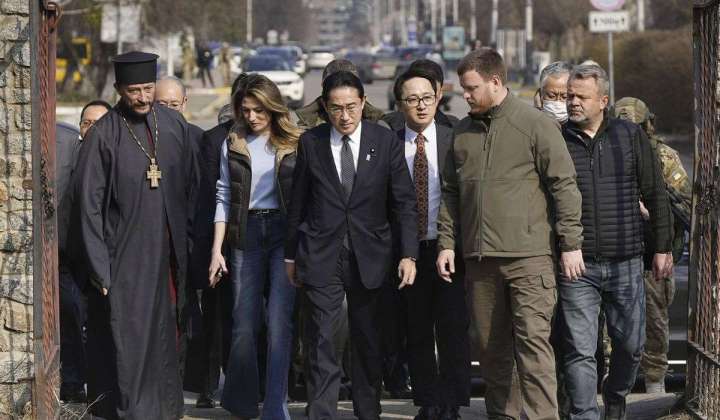Japan’s Kishida makes surprise Kyiv trip while China’s Xi visits Moscow

Japanese prime ministers are not known for stealing the spotlight, but Prime Minister Fumio Kishida on Tuesday managed to upstage Chinese leader Xi Jinping during his high-profile summit in Russia, making a surprise visit to Kyiv for talks with President Volodymyr Zelenskyy and top Ukrainian officials.
The side-by-side visits of two East Asian leaders to two warring European capitals are just the latest in a growing list of convergences between Atlantic and Indo-Pacific alliances and rivalries.
Mr. Kishida, who will host President Biden and other leaders of the G-7 group of industrial powers at a summit in May, was shown on Japan’s NTV riding a train from Poland to Kyiv, Ukraine’s capital. It’s been a busy month of diplomacy for the conservative Japanese leader as he prepares for the summit: he hosted South Korea’s president in Tokyo last week in a bid to ease the tense bilateral relationship and traveled directly to Ukraine after talks with Indian Prime Minister Narendra Modi in New Delhi.
Japan’s Foreign Ministry said Mr. Kishida made the Kyiv trip to underscore the “unwavering” support of the G-7 powers for Ukraine as it tries to turn back a 13-month Russian invasion. In a gesture sure to provoke Russian President Vladimir Putin, Kyodo News reported that Mr. Kishida visited a church in Bucha, the town outside Kyiv that has become synonymous with reported Russian military atrocities linked to the invasion.
The Japanese Foreign Ministry statement said Mr. Kishida in his talks with Ukrainian leaders will “resolutely reject Russia’s aggression against Ukraine and unilateral changing of the status quo by force, and reconfirm his determination to uphold the international order based on the rule of law.”
Subsequently, Mr. Kishida will meet with leaders in Poland, the ministry said.
Mr. Kishida’s Kyiv trip was kept under wraps. “It is rare for a Japanese leader to make an unannounced trip to a foreign country,” Kyodo News reported, which added that the visit “had been kept secret until right before arrival.”
Though multiple Western leaders have visited war-torn Kyiv, including Mr. Biden and the heads of major Western European powers, analysts said it was an unusual move by cautious Mr. Kishida.
Unlike the U.S. and leading NATO powers, Japan has not provided arms to Ukraine in the war, but it has dispatched a wide range of support, including drones, optical devices, uniforms, helmets, body armor, tents, medical kits and generators. According to the statistics compiled by the Kiel Institute for the World Economy, Japan is the 10th largest source of aid to Ukraine with roughly $7 billion in aid — and the only non-Western country on the list.
Mr. Putin wasn’t the only one being sent a message by the Japanese prime minister, whose recent trips have unnerved China as well. Beijing has complained loudly that Tokyo and Washington are collaborating to strengthen alliances across the Indo-Pacific in an effort to contain Beijing’s economic and military rise.
India and Japan are both members of the “Quad” security dialog, but while India is postured against China in the Himalayas and the Indian Ocean, it remains amicable with Russia, which supplies India with both arms and energy.
During the New Delhi summit, Mr. Kishida reiterated that Japan will support India’s maritime security, and will provide patrol vessels and other equipment. Mr. Modi also accepted an invitation to participate in the G-7 summit in Hiroshima, Japanese officials said. As host, Mr. Kishida has signaled he has also asked Australia, Brazil, the Comoros, the Cook Islands, Indonesia, South Korea and Vietnam to take part in the Hiroshima gathering.
“Kishida aims to strengthen solidarity with the so-called Global South and promote a free and open Indo-Pacific at the summit,” the Yomiuri Daily reported.
China’s Mr. Xi has also been stepping up his global diplomatic profile, in the wake of having secured a precedent-breaking third five-year term as president earlier this month. Mr. Xi’s Moscow summit follows what looks like a major diplomatic triumph for Beijing in the Middle East, brokering the restoration of diplomatic relations between Sunni Saudi Arabia and Shiite Iran.
Mr. Putin and Mr. Xi are also expected to discuss a new Chinese “peace plan” for the Ukraine war, although the Biden administration has slammed the proposal as locking in some Russian land grabs from the war in Ukraine’s fiercely contested Donbas region.
Beijing and Moscow share no formal alliance, instead calling their relationship “an unlimited partnership.” China has expanded trade and energy exports from Russia despite Western sanctions over the past year, and Washington loudly criticizes Beijing for not pressuring Mr. Putin to pull back. Secretary of State Antony Blinken said China shows “no responsibility” to hold Russia accountable for “atrocities committed in Ukraine.”
U.S. and NATO officials have said in recent weeks they have seen signs China is considering sending military aid and arms to Russia’s stressed military, a charge Mr. Xi’s government has denied. Iran, meanwhile, has supplied military drones to Moscow and Washington accuses North Korea of supplying artillery ammunition and rockets.
Chinese Foreign Ministry spokesman Wang Wenbin told reporters in Beijing Tuesday that Mr. Xi and Mr. Putin had discussed China’s Ukraine proposal, saying Russia has “carefully studied” the Chinese plan and “is open to peace talks.”
Asked about Mr. Kishida’s simultaneous trip to Kyiv, Mr. Wang said only, “We hope Japan could do more things to de-escalate the situation instead of the opposite.”
- This article was based in part on wire service reports.






